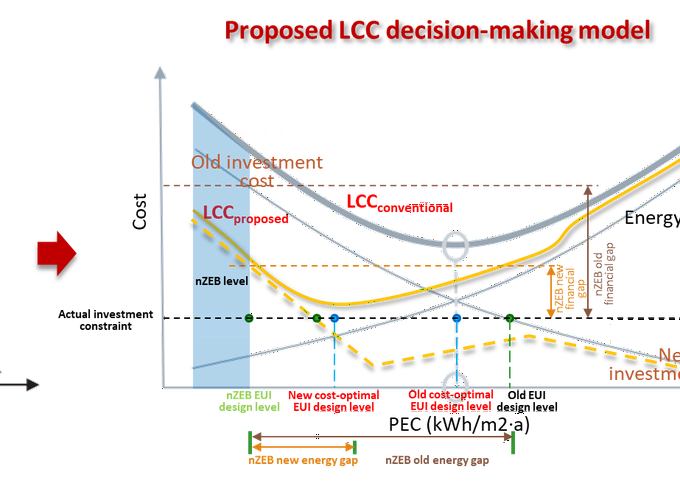Life-cycle cost analyses (LCCA) is usually coupled with whole building energy optimization to generate the cost-optimal design with good energy efficiency. Comparing with the isolated building system optimization, a combination of passive and active strategies is generally recognized that can result in a lower life-cycle cost (LCC) with better energy performance in the literature. With the passive design parameters being optimized, the heating and cooling load of the building could be decreased, leading to a reduction in the size of the HVAC system. for integrated building design. However, in the current cost-optimal decision-making framework, there is no difference in the costing process whether it is performed on the integrated building system or the single system energy optimization. Although the dynamic energy simulation can well demonstrate the energy benefit gained from the integrated design, the cost-benefit usually be highly underestimated due to the little considering of the effect that load reductions have on the capital and running costs of the HVAC system.
Against this background, this research proposes a holistic LCC optimization approach for the integrated building design, which concerns the cost integration between passive design and HVAC costs and the tradeoff between initial investment for ECMs and long-term benefits. Three LCC optimization methods are performed for the case study and their impact on Pareto front solutions’ energy and cost performance is compared in this study. This research can contribute to a better understanding and interpretation of the cost-effectiveness in energy conservation, which is the basis for successful design decisions and policy implementation.
To improve energy efficiency, evaluating the energy savings potential of energy conservation measures (ECMs) is a critical task. During new buildings design or building retrofits, occupancy and plug-loads schedules can significantly impact building energy use and is a leading factor in uncertainty when determining the effectiveness of ECMs and operation strategies. Current simulation-based assessment methods simplify the occupancy related schedules by using a standard or representative set of static and homogeneous assumptions. The simplification contributes to significant gaps between the simulated and measured actual energy performance of buildings.
This study presents a framework for identifying and quantifying the impact of occupancy-related schedules on ECMs’ performance using building energy simulation. An institutional building located in Singapore is used for a case study. Two spatial resolution and five temporal resolution are combined to establish different base models for energy simulation, representing different accuracy levels of occupancy-related schedules. Then, a simulation workflow is performed for each ECM to determine its energy savings under different levels of input schedules. Finally, the ECM decision is determined based on the simulated energy performance and compared among different base models. This research can contribute to our understanding of the interactions between model complexity and energy efficiency design, facilitating future discussions on the right level of abstraction when modeling occupancy in building performance simulation.

